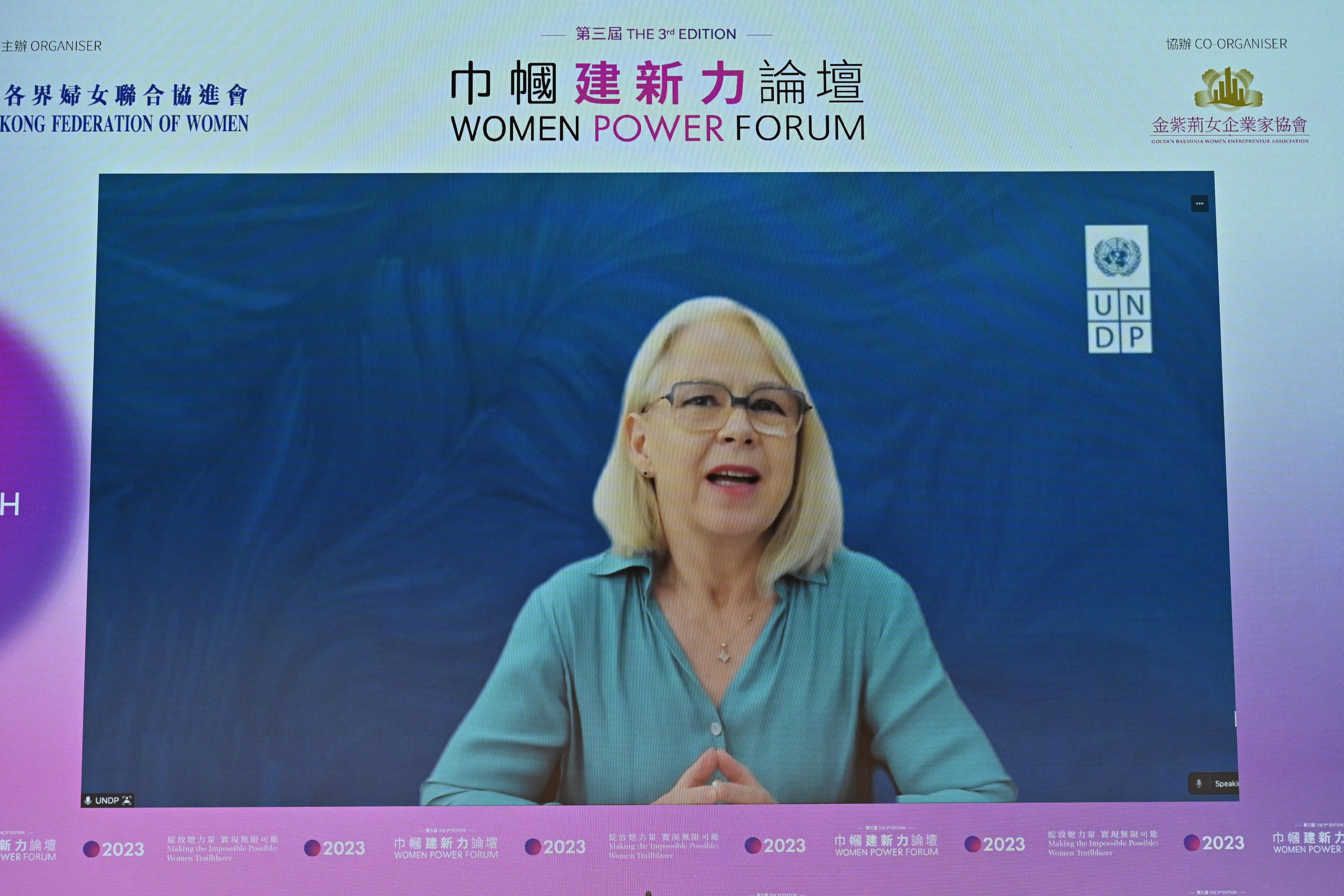Opening Remarks by Ms Beate Trankmann at the 2023 Women Power Forum
June 30, 2023

Ms Beate Trankmann, Resident Representative, UNDP China, delivered remarks virtually at the Women Power Forum in Hong Kong
Honourable Mr. Leung Chun-ying,
Distinguished Madam Huang Xiaowei,
H.E Mr. Chan Kwok-ki,
Distinguished Madam Lu Xinning,
Distinguished Madam Pansy Ho,
H.E Madam Mariam Mwinyi,
Dear fellow speakers, guests and friends,
It is such a pleasure and honour to join you today on behalf the UN Development Programme on a topic that is close to my heart. And I much regret that schedules didn’t allow me to travel to Hong Kong and be there with you in person.
This year's theme of promoting women's leadership in innovation and development is of utmost importance.
Our world has seen remarkable progress in improving the lives of millions through technological advancements and scientific breakthroughs - but we continue to face daunting challenges ahead. In this uphill battle, we cannot afford to leave half of the world's potential untapped.
We need women's full participation and leadership to tackle the climate crisis, the transition to a green economy, and to realise the vision of the Sustainable Development Goals for an inclusive and sustainable future for all….
But gender equality worldwide remains a distant dream! Only 8 percent of Fortune 500 CEOs were women in 2022, and women held around 16 percent of board positions in Hong Kong companies. Although we’ve just heard the important progress Hong Kong has made in increasing female representation in Government leadership.
Biased gender social norms continue to be a significant obstacle for women. Our societies’ perceptions of women, as well as how women see themselves, hold them back. UNDP’s 2023 Report on Gender Social Norms Index reveals that 9 out of 10 men and women globally still hold biases against women, and two out of five people believe men make better business executives.
As part of our advocacy campaign, #HerStory, we interviewed over 100 female leaders in STEM sectors worldwide. They all experienced gender bias to some degree. For example, Dr. Carol Mundell, who is currently the European Space Agency's Director of Science, was denied a promotion earlier in her career after giving birth, despite her excellent academic record.
Our world has seen remarkable progress in improving the lives of millions through technological advancements and scientific breakthroughs - but we continue to face daunting challenges ahead. In this uphill battle, we cannot afford to leave half of the world's potential untapped.Beate Trankmann, Resident Representative, UNDP China
Although these gender biases and obstacles limit the number of women in top leadership positions, this is not inevitable. We know the remedies:
First, we must create equal opportunities in education and skills development as the foundation for leadership and innovation. This is especially important as we embark on the digital era and amidst the growth of frontier technologies.
80 percent of high-paid jobs in new green economy sectors will be in STEM fields that are currently dominated by men. Unless women and girls are supported to pursue careers in these areas, they risk being overlooked and left behind.
Second, promoting work-life balance and flexible work policies is essential to ensure women have a fair chance at reaching the top.
Societal expectations hinder women's progress. By implementing family-friendly policies such as flexible work hours, parental leave, and affordable childcare, we enable women to excel professionally, while maintaining a fulfilling personal life.
To realise that vital balance for women though, we also need equality more broadly, including at home – because there can only be equality at work when there is equality in every part of life. In Sweden, for example, parents are entitled to a combined 480 days of leave, with the right to 240 days each. As a result, it ranks second in female Executive representation among 19 European countries assessed by European Women on Boards. Countries and workplaces that prioritise work-life balance not only attract and retain top talent, but also cultivate innovation and well-being, with lasting returns.
Thirdly, we need to redefine leadership and reshape its image for a more modern, inclusive era. For too long, leadership has been associated with ‘masculine traits’ like assertiveness, aggression, and impulsiveness.
However, women leaders that lead with transparency, flexibility and greater inclusiveness have excelled. During the COVID-19 pandemic only 10 percent of prime ministers and heads of state were women, yet researchers found they accounted for 40 percent of successful pandemic responses.
Promoting gender diversity in the leadership selection process should also be of strategic importance for companies and organisations. McKinsey found that equality also makes business sense, as organisations with gender-diverse executive boards outperform financially by 25 percent.
At UNDP, we strive to walk the talk on female leadership. Currently, 8 out of 10 of the top leadership are women. Across the organisation worldwide, around 47 percent of our senior management team are women - up from 27 percent in 2017.
Many of you are in the top of your professions and with this success comes responsibility. By using a pay-it-forward approach, we all, as women leaders, can share our knowledge, experience, and resources with those who come behind us - supporting the next generation of female trailblazers and advancing society collectively.
Empowering women leaders is not only a matter of justice and equality, but essential for our shared future.
By embracing diversity and celebrating women's leadership, we can unlock the vast reservoir and power of female talent to help drive innovation and create a better, brighter world for all.
So, let us work together to dismantle the barriers that hinder women's progress, forging societies where gender equality is not just an aspiration, but a lived reality.
Thank you.

 Locations
Locations